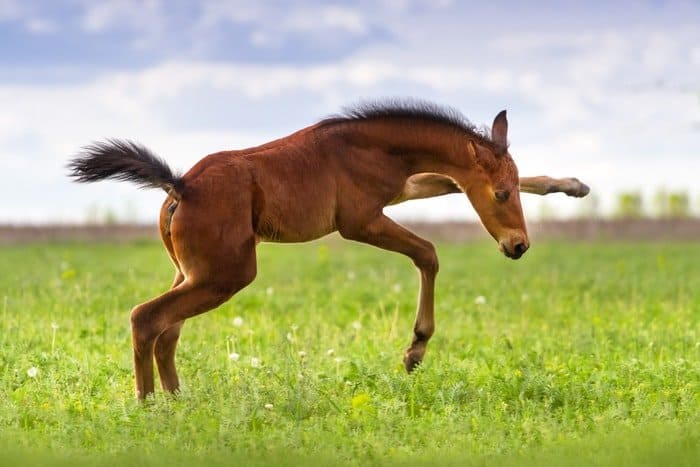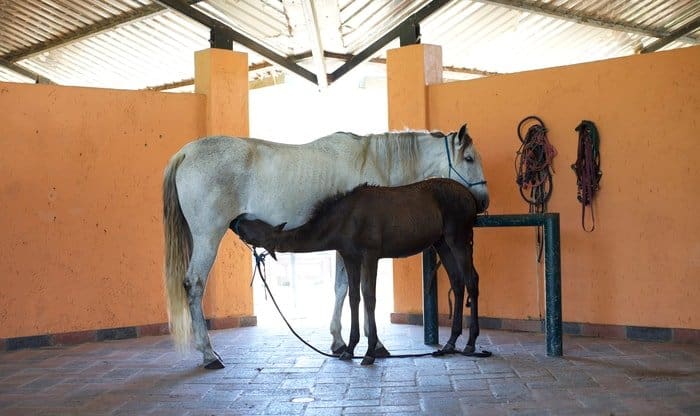Last Updated on January 8, 2022
One of the most difficult things to overcome when raising horses is knowing when to wean a foal. Weaning is the process of separating a foal from his mother after he no longer needs her milk to survive. There are many different schools of thought on weaning and how it should be properly done.
One of the hottest and most debated topics when it comes to weaning is what age a foal should be when it is weaned. Different trainers and breeders swear by different ages, and it’s hard for simple horse people and home-breeders to know what to make of it.
In this article, I’m going to take a holistic approach by discussing other factors that may contribute to an owner’s decision to wean at a particular age. I will cover what the most common ages for weaning are, and why, but I think it’s important to understand all of the factors that go into the decision, not just looking at the numbers.
When To Wean A Foal- Factors to Consider
Besides just the age of the foal, there are many factors that contribute to an owner or breeder’s decision to wean a horse at a given time. Some of these include the extent of available facilities, the size of the foal, the temperament of the foal, and the vet work a foal has had done.
Available Facilities
Some facilities are more equipped to deal with weaning than others. Breeding farms, for example, are set up to care for foals regularly. The staff at breeding farms is trained to know how to handle foals, and they are used to weaning foals regularly. That’s because this is one of the primary functions of a breeding farm.
But, not every foal is born on a breeding farm. Lots of foals are born and raised at home farms and at normal boarding farms. Typically, these farms are equipped to care for normal, adult horses. Because of this, sometimes the methods of weaning will have to be restricted to whatever a particular facility can provide.
This could mean any number of things for every unique situation; it could mean that the mare and foal’s pastures are simply further apart, it could mean that the foal has to go out with other horses, it could mean that the foal has to wait to be weaned until there’s an available pasture for it to be turned out in and so on.
But, facility restrictions can affect when a foal is weaned.
Size of the Foal
The size of the foal can also affect when an owner or breeder decides to wean him. For example, if a foal is larger than other foals his age, the owner or breeder may decide to wean him earlier, for the safety of his mother or other horses he is turned out with.
Or, on the other hand, an owner or breeder may decide to wean a horse later, if he is small for his age. He may still need the nutrients from his mother’s milk if he hasn’t grown in the way he should. Vets should also help make this decision.
Temperament of the Foal
Another factor is the temperament of the foal. Sometimes, though rarely, foals will start weaning themselves. Some foals naturally become less dependent on their mothers earlier than expected. If they begin showing signs of this, there is nothing wrong with weaning a foal early.
Sometimes foals show you that they’re ready before you even think of it. Some foals mature more quickly than others, though this definitely isn’t the norm. But, it’s always important to listen to your horse, even if your horse is a baby.
Vet Work Done on the Foal
Another factor that can affect when to wean a foal is the vet work a foal has had done. Some owners and breeders have certain things they want to have their vets do with their foals before they are weaned. And, if they haven’t had these things done yet, they will wait until the foal has had them done before weaning.
Some foals also struggle with health issues early on, and it is important that the foal is completely healthy before weaning him.
Read more about What Is The Difference Between A Colt And A Foal?
Average Ages for Weaning Foals
In the wild, foals are not “weaned” from their mothers until their mothers have another foal. This is typically not until a year or more after the foal has been born. A horse’s gestation period is a little bit over a year.
Traditionally, foals are weaned between the ages of four and seven months. Though, it isn’t uncommon to see foals stay with their mother for longer than seven months.
On the other hand, if an owner or breeder decides to wean a foal at four months, they must ensure that the foal is completely healthy. At four months, a foal should be able to get essential nutrients from foods other than his mother’s milk. But, if the foal has had any health issues at all, then this may not be the case.
Conclusion
So, it really depends on the situations and the philosophies of each owner and breeder. Deciding when to wean a foal will rest on many different factors. The most important thing to take into consideration is a foal’s health.
If weaning a foal at any given time will negatively affect his health, then it should not be done. Every foal is unique, and every situation is unique. Make informed decisions and always, always consult professionals!
I hope this article helped you learn more about when to wean a foal and what goes into making decisions about weaning. If so, please share this article, and share with us your experiences weaning foals!
FAQs
How long does weaning a foal take?
Weaning a foal should be done gradually. If weaned too quickly, the foal will likely experience health problems and digestive issues that often result in weight loss or other complications. Weaning is generally done when the horse is between six months and one year old. The process can take anywhere from two to four months. During weaning, the foal should still receive adequate nutrition through a feeding schedule that limits quantities of mother's milk while increasing levels of roughage.
Weaning is often done gradually by adding layers of weaning techniques to ensure the foal's physical and emotional needs are met while it adjusts to life without its mother. For example, it might start with weaning the foal from its mother's milk, then weaning it by keeping them physically separated. Eventually, it may also involve weaning the mare and foal emotionally so they are no longer bonded to each other.
How long does a foal need to stay with its mother?
A foal should remain with its mother for at least four to six months. During this time, different weaning techniques may be used to wean the foal from its mother's milk gradually.
It is important that foals stay with their mothers until the process is completed. When weaning is not done gradually, foals often develop digestive problems like bloating. Bloating occurs when too much gas builds up in the stomach of a horse, which can be caused by an improper balance of micro organisms in the gastrointestinal tract.
The weaning process should happen in intervals in order to ensure the foal is receiving adequate nutrition. This also helps to prevent any behavioural issues caused by weaning the foal too quickly.
For how long do mares remember their foals?
It is speculated that mare remember their baby foals for up to two years after weaning them, but this may depend on the individual mare.
Mares are able to recognize their babies' voices as well as their smell. They may also remember the size and shape of their foal. For example, a mare might react in a dominant way towards a foal that is smaller than her own offspring to prevent it from challenging her authority. Additionally, mares often become more protective of foals when another animal, such as a dog or another mare, approaches them. This is because mares may consider foals to be in their care, even after weaning process is complete.
There are also theories that during weaning, mares experience memory loss in order to help them cope with the process when separated from their babies. This means when geographically separated from their foals, mare may not remember them for longer than two years.
How do wild horses wean their foals?
Studies suggest that wild mares wean most of their foals when they are about one year old, but their weaning is complete when they are about two years old.
Wild horses wean their foals in three stages over the course of about two years. These stages are weaning the foals from nursing, weaning them from their mothers' milk, and weaning the mare and foal emotionally.
The process is not quick, but all necessary nutrients are supplied to foals so they continue to grow and thrive while weaning is underway.
The weaning process is generally more kind for wild horses because foals stay with their mothers and other members of the herd for much longer time. This allows foals to develop better social skills and become more independent.
Michael Dehaan is a passionate horse owner, horse rider, and lover of all things equine. He has been around horses since he was a child, and has grown to become an expert in the field. He has owned and ridden a variety of horses of different breeds, and has trained many to compete in shows and competitions. He is an experienced horseman, having worked with and competed many horses, including his own. He is an active member of the equestrian community, participating in events and teaching riding lessons.



